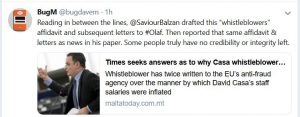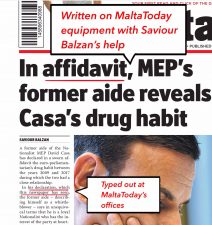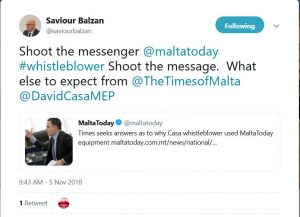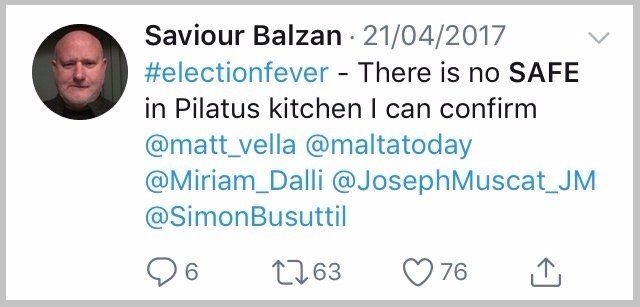Media Today Managing Editor Saviour Balzan has just admitted that the evidence on which he relied to publish allegations of wrongdoing against the Opposition’s Head of Delegation David Casa were created in his own office. And he seems to think that there is no problem with that.
The Times of Malta today published a story revealing that Balzan showed up as the “author” of two letters sent by a former aide to Casa, one to OLAF and another to the AG, about alleged irregularities in the MEP’s finances.
Pre-empting the Times of Malta’s report, Malta Today published a quick admission by Balzan admitting that each of the affidavit by that former aide as well as the subsequent letters were written on MaltaToday equipment at MaltaToday’s offices.
It seems Balzan helped create the evidence he needed for his own story and then reported it on Malta Today’s front page as news. When The Times of Malta asked Balzan to explain himself, he said he did this to give the “whistleblower maximum protection”.
No. The source gives you the information and the journalist’s job is to go out and dig up the evidence needed to confirm what the source says – very often, along the way, the journalist discovers that the reality is not quite how the source framed it (sources have agendas too), which is the whole point of the exercise.
If the whistleblower wanted an affivadit, Balzan should have sent him to a lawyer. A journalist does not help his/her source create the evidence to substantiate the story behind closed doors. Journalists do not go around helping their sources write up the evidence they need to suit a particular agenda.
The reason why they do not do that is because it opens the door to suggestion, leading the witness in a direction that can give you the best headline rather than the truth.
Balzan said: “After considering the statements made by the whistleblower, the drafting of the affidavit and verification of statements and other evidence was made in my office, to give this whistleblower maximum confidentiality. In the course of our meetings, the whistleblower has used office equipment to draft statements”.
The statement goes on to say that “this does not change anything from the substance of the story”. But of course it does. It changes everything. Balzan’s original article placed heavy reliance on the affidavit using it as the main reason for that whistleblower’s credibility.
Does the information that the affidavit was written at Malta Today’s offices on Malta Today’s equipment and in all likelihood with Balzan’s help, change those headlines?
What about the phrase referring to the whistleblower’s “declaration, which this newspaper has seen” in a story written by Balzan himself when he knew how that affidavit took shape.  What Balzan did next was lash out, saying that the new revelations were nothing more than a plot by Casa’s aides to discredit the whistleblower and cover up wrongdoings. But the focus here is not the whistleblower; it’s Balzan’s actions. Balzan is not the victim here.
What Balzan did next was lash out, saying that the new revelations were nothing more than a plot by Casa’s aides to discredit the whistleblower and cover up wrongdoings. But the focus here is not the whistleblower; it’s Balzan’s actions. Balzan is not the victim here.
 In a statement, the EPP group said the systematic targeting of government critics by supposedly independent media acting on orders from Castille was “outrageous”.
In a statement, the EPP group said the systematic targeting of government critics by supposedly independent media acting on orders from Castille was “outrageous”.
Casa said: “I am not shocked by today’s revelations concerning who really wrote the ‘whistleblower’ letters. It has been clear that, particularly following my work on the leaked FIAU report calling for police action against Konrad Mizzi, I have been a target. But this level of collusion, deceit and fabrication of ‘news’ is unprecedented and completely inexcusable”.
Last week, Balzan repeated his criticism of assassinated journalist Daphne Caruana Galizia suggesting she was anything but a journalist. He wrote this in Malta Today’s sister newspaper Illum, which had run a front page story in the previous edition making false allegations relating to the magisterial inquiry into her death. The story was proved false in a parliamentary question only a few days later.
Caruana Galizia had exposed Balzan’s 1am chat with the Prime Minister’s chief of staff Keith Schembri at a time when the government was cornered – Balzan had threatened to sue for libel, only to retreat when the logs were published proving she was right.
On another occasion, Balzan even tweeted he could confirm there was no safe in Pilatus Bank when (by his own later admission) he was not even in Malta at the time so the only way he could confirm anything was by someone else telling him. This was confirmed by sources within his own newsroom.













